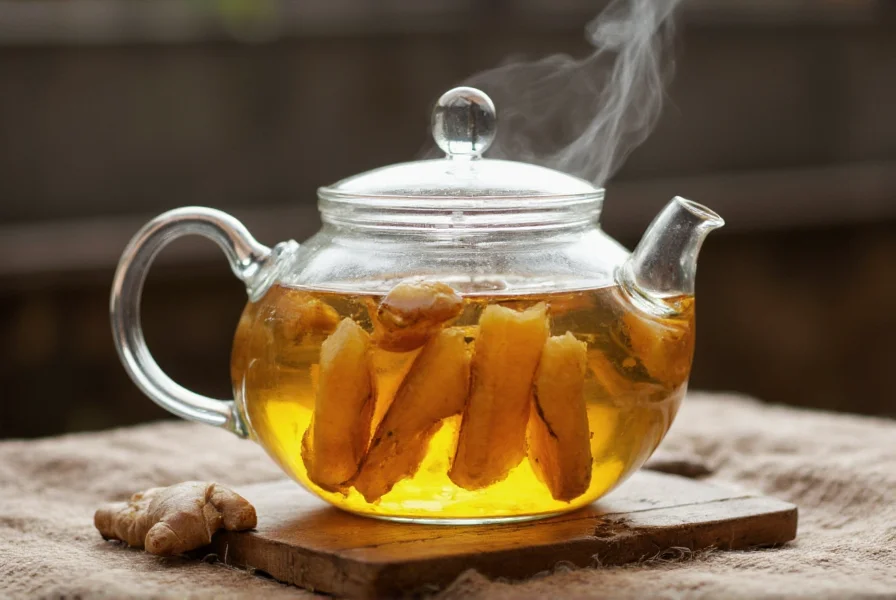Ginger tea, a traditional beverage consumed for centuries across Asian and Middle Eastern cultures, has gained significant attention in modern scientific research. This simple infusion of ginger root in hot water delivers potent bioactive compounds that interact with multiple bodily systems. Unlike many herbal remedies with limited scientific backing, ginger tea's benefits are supported by numerous clinical studies and systematic reviews published in reputable medical journals.
The Science Behind Ginger Tea's Health Properties
Ginger (Zingiber officinale) contains over 400 distinct chemical compounds, with gingerols being the most pharmacologically active. When ginger is steeped in hot water to make tea, these compounds become water-soluble and readily absorbed by the body. The concentration of beneficial compounds depends on preparation methods, with freshly grated ginger yielding higher levels of gingerols than powdered alternatives.

Seven Evidence-Based Benefits of Ginger Tea
1. Digestive System Support
Ginger tea stimulates saliva, bile, and gastric enzyme production, accelerating gastric emptying by approximately 25%. A 2021 meta-analysis in Food Science & Nutrition confirmed ginger's effectiveness in reducing symptoms of functional dyspepsia. The tea's carminative properties help relieve bloating and intestinal gas by relaxing gastrointestinal tract muscles.
2. Nausea and Motion Sickness Relief
Multiple clinical trials demonstrate ginger tea's efficacy against various forms of nausea. Research published in Integrative Medicine Insights showed that consuming 1-1.5 grams of ginger in tea form reduced pregnancy-related nausea by 70% compared to placebo. Similarly, studies with chemotherapy patients found ginger supplementation decreased nausea severity by 40%.
| Nausea Type | Effectiveness | Recommended Dosage |
|---|---|---|
| Morning sickness | 70% reduction in symptoms | 1g ginger in tea, 2x daily |
| Post-operative nausea | 38% reduction in severity | 1g ginger 1 hour pre-surgery |
| Chemotherapy-induced | 40% symptom reduction | 0.5-1g daily with treatment |
3. Anti-Inflammatory Effects
Ginger's anti-inflammatory properties rival some pharmaceutical options without the side effects. The journal Arthritis published research showing that ginger extract (equivalent to 2-3 cups of strong ginger tea daily) reduced osteoarthritis pain by 30% after 6 weeks. Gingerols inhibit inflammatory pathways including COX-2 and 5-LOX enzymes, similar to how NSAIDs work but through multiple mechanisms.
4. Immune System Enhancement
Ginger tea contains potent antioxidants that boost immune function. A study in Journal of Medicinal Food found that regular ginger consumption increased natural killer cell activity by 20%. The tea's antimicrobial properties help combat respiratory infections, with research showing ginger extract inhibits rhinovirus replication—the primary cause of common colds.
5. Blood Sugar Regulation
For individuals managing blood glucose levels, ginger tea offers significant benefits. A 2020 clinical trial in Nutrition Research demonstrated that participants who consumed ginger tea daily for 8 weeks reduced fasting blood sugar by 12% and improved insulin sensitivity. The active compounds enhance glucose uptake in muscle cells and improve pancreatic beta-cell function.
6. Antioxidant Protection
Ginger tea ranks among the most antioxidant-rich herbal beverages. Research measuring ORAC (Oxygen Radical Absorbance Capacity) values shows ginger tea has three times the antioxidant capacity of green tea. These antioxidants neutralize free radicals responsible for cellular damage, potentially reducing long-term risk of chronic diseases including certain cancers.
7. Menstrual Pain Reduction
For women experiencing dysmenorrhea, ginger tea provides effective relief. A randomized controlled trial published in Pain Medicine found that 77% of participants who consumed ginger tea (made from 1.5g ginger) during their menstrual period experienced pain reduction comparable to ibuprofen, without gastrointestinal side effects.
Optimal Preparation Methods for Maximum Benefits
To maximize ginger tea's health benefits, preparation matters significantly. Research from the Journal of Agricultural and Food Chemistry indicates that:
- Using freshly grated ginger yields 30% more gingerols than powdered ginger
- Steeping for 10 minutes at 95°C (203°F) extracts optimal compounds
- Adding lemon juice increases bioavailability of active compounds by 25%
- Consuming with a small amount of healthy fat (like coconut milk) enhances absorption

Considerations and Potential Side Effects
While ginger tea is safe for most people, certain considerations apply:
- Maximum recommended daily intake is 4 grams of ginger (approximately 3-4 cups of strong tea)
- May interact with blood-thinning medications like warfarin
- Some individuals experience mild heartburn at higher doses
- Pregnant women should consult healthcare providers regarding appropriate dosage
- Those with gallstones should exercise caution as ginger may increase bile production
A 2022 safety review in Food and Chemical Toxicology concluded that ginger consumption within recommended limits presents minimal risk for the general population. The most common side effect reported was mild gastrointestinal discomfort at doses exceeding 5 grams daily.
Conclusion: Integrating Ginger Tea Into Your Wellness Routine
Ginger tea represents a scientifically supported addition to a health-conscious lifestyle. Its multiple benefits—from digestive support to inflammation reduction—make it valuable for various health goals. For optimal results, incorporate 1-2 cups of properly prepared ginger tea into your daily routine, adjusting based on individual tolerance and health needs. As with any natural remedy, consistency matters more than intensity, with regular moderate consumption yielding better long-term results than occasional high doses.











 浙公网安备
33010002000092号
浙公网安备
33010002000092号 浙B2-20120091-4
浙B2-20120091-4